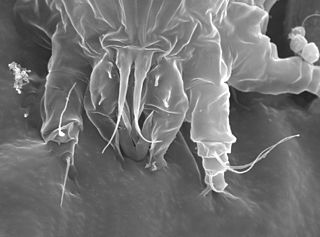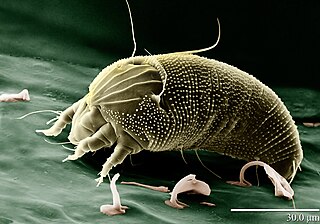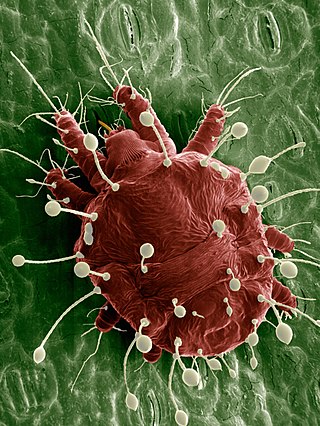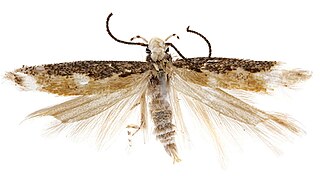
Classical Hollywood cinema is a term used in film criticism to describe both a narrative and visual style of filmmaking which first developed in the 1910s to 1920s during the latter years of the silent film era. It then became characteristic of American cinema during the Golden Age of Hollywood, between roughly 1927 to 1969. It eventually became the most powerful and pervasive style of filmmaking worldwide.

Milton R. Krasner, A.S.C. was an American cinematographer who won an Academy Award for Three Coins in the Fountain (1954).

Russell Metty, A.S.C. was an American cinematographer who won the Academy Award for Best Cinematography, Color, for the 1960 film Spartacus.
Aberoptus is a genus of mites belonging to the family Eriophyidae. These tiny mites, flattened in shape, live beneath the waxy layer on the underside of the leaves of certain plants.

Aristotelia is a genus of moths in the family Gelechiidae. Well-known species are food plant specialists, and diverse hosts are used – Salicaceae, Solanaceae, Rosaceae, Fagaceae, Fabaceae, Asteraceae.

Eriophyoidea are a superfamily of herbivorous mites. All post-embryonic instars lack the third and fourth pairs of legs, and the respiratory system is also absent.

Aceria is a genus of mites belonging to the family Eriophyidae, the gall mites. These tiny animals are parasites of plants. Several species can cause blistering and galls, including erineum galls. A few are economically significant pests, while others are useful as agents of biological pest control of invasive plants such as rush skeletonweed, creeping thistle, and field bindweed.

Raoiella indica, commonly known as the red palm mite, is a species of mite belonging to the family Tenuipalpidae. A pest of several species of palm in the Middle East and South East Asia, it is now becoming established throughout the Caribbean. The invasion of this species is the biggest mite explosion ever observed in the Americas.

Aceria guerreronis, the coconut mite, is an eriophyid mite which infests coconut plantations. It is economically devastating, and can destroy up to 60% of coconut production. The immature nuts are infested and injured by mites feeding in the portion covered by the perianth of the immature nut.

Acalitus is a genus of mites in the family Eriophyidae. These cosmopolitan, microscopic arthropods form galls on various plants, and some species such as Acalitus essigi and Acalitus vaccinii are pests of agricultural significance associated with berry crops. This genus includes the following species:

Aculus is a genus of mites, including the following species:

Phyllocoptes is a genus of acari, including the following species:

Mordellistena is a genus of beetles in the family Mordellidae, containing the following species:

Schinopsis brasiliensis is a species of flowering plant in the cashew family known by the common names baraúna or braúna.

759 Naval Air Squadron was a Naval Air Squadron of the Royal Navy's Fleet Air Arm. It was created on November 1st, 1939 and was disbanded on December 24, 1969. It was initially intended as a Telegraphist Air Gunner Training Squadron but became a Fighter School and Pool Squadron in 1939, at RNAS Eastleigh. It operated out of RNAS Yeovilton from 1940 to 1946, as part of the Naval Air Fighter School. In 1943 a detachment operated out of RNAS Angle, working with 794 NAS and known as the Naval Air Firing Unit. It was again the Naval Air Fighter School upon reformation in 1951 and disbandment in 1954, firstly at RNAS Culdrose and then moving to RNAS Lossiemouth, in 1953. The squadron reformed again, this time at RNAS Brawdy in 1963, as the Naval Advanced Flying Training School, before finally disbanding in 1969.

Gelechiinae is a subfamily of moths in the family Gelechiidae. It was described by Henry Tibbats Stainton in 1854.















